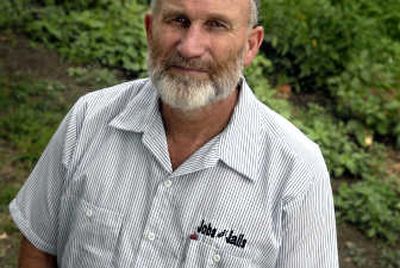Garden of unity

Once covered with weeds, strewn with garbage and trashed with broken-down cars, vacant lots in Spokane’s West Central neighborhood could blossom into lush green havens by next spring.
A project known as Riverfront Farms hopes to transform these blots on the landscape into community gardens – patches of vegetable beds, fruit trees and flowers that not only will nourish the poor who line up at local food banks, but also create unity among West Central residents while providing work for at-risk youth.
“It’s a way to get the neighborhood connected,” said Patrick Malone, one of the project leaders. “How do you create employment opportunities for youth? How do you build pride in place? These lots shouldn’t just be dumping grounds. They’re part of the neighborhood that can be turned into something beautiful and productive.”
Malone, who has long been involved in the area’s revitalization, came up with the idea along with other West Central residents. Together with the Interfaith Council’s Faith and Environment Network and several faith communities, these neighbors have been trying to clean up the vacant lots for the last few years. In recent months, they’ve started talking to the owners of these lots and researching options on how they can work together to improve these properties.
They decided to build upon the idea of creating a farm right in the heart of their neighborhood.
This week, those involved in the Riverfront Farms project will gather at Holy Trinity Episcopal Church to discuss plans to break ground and plant a winter crop by October. The first garden will be planted on two city lots adjacent to and owned by Holy Trinity, according to Malone.
Riverfront Farms also recently received an anonymous donation of property, which will be used as garden space and to provide housing for a part-time urban farmer who will supervise the project.
While most community gardens involve the renting of plots for personal use, Riverfront Farms will grow fresh produce that will be offered at local food banks, said Malone, who traveled to Boise to learn more about the city’s Urban Garden School and to Seattle, where residents are involved in a program called P-Patch. Eventually, some of the produce grown in the West Central neighborhood may be sold in a neighborhood farmers’ market.
Organizers hope their community gardens will serve as an example to other neighborhoods in Spokane. Once they establish a working model by next spring or summer, Malone and others plan to be available to others who want to establish an urban farm in their own neighborhoods.
Riverfront Farms also will be part of West Central’s Project HOPE, a collaboration of churches, businesses, law enforcement, educators and others that seek to reduce gang activity and provide mentorship and activities to young people. Organizers hope to hire at-risk youth as assistants in the garden to work alongside community volunteers.
“These efforts are interrelated and build on each other,” Malone explained. “Riverfront Farms will serve at-risk youth, but it will also create opportunities for the whole neighborhood.”
Reach reporter Virginia de Leon at (509) 459-5312 or virginiad@spokesman.com.